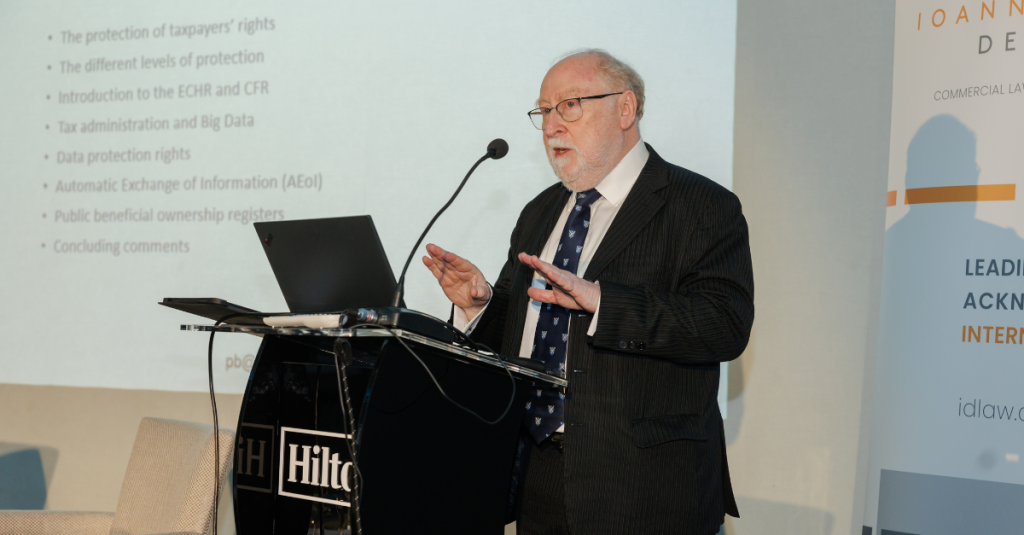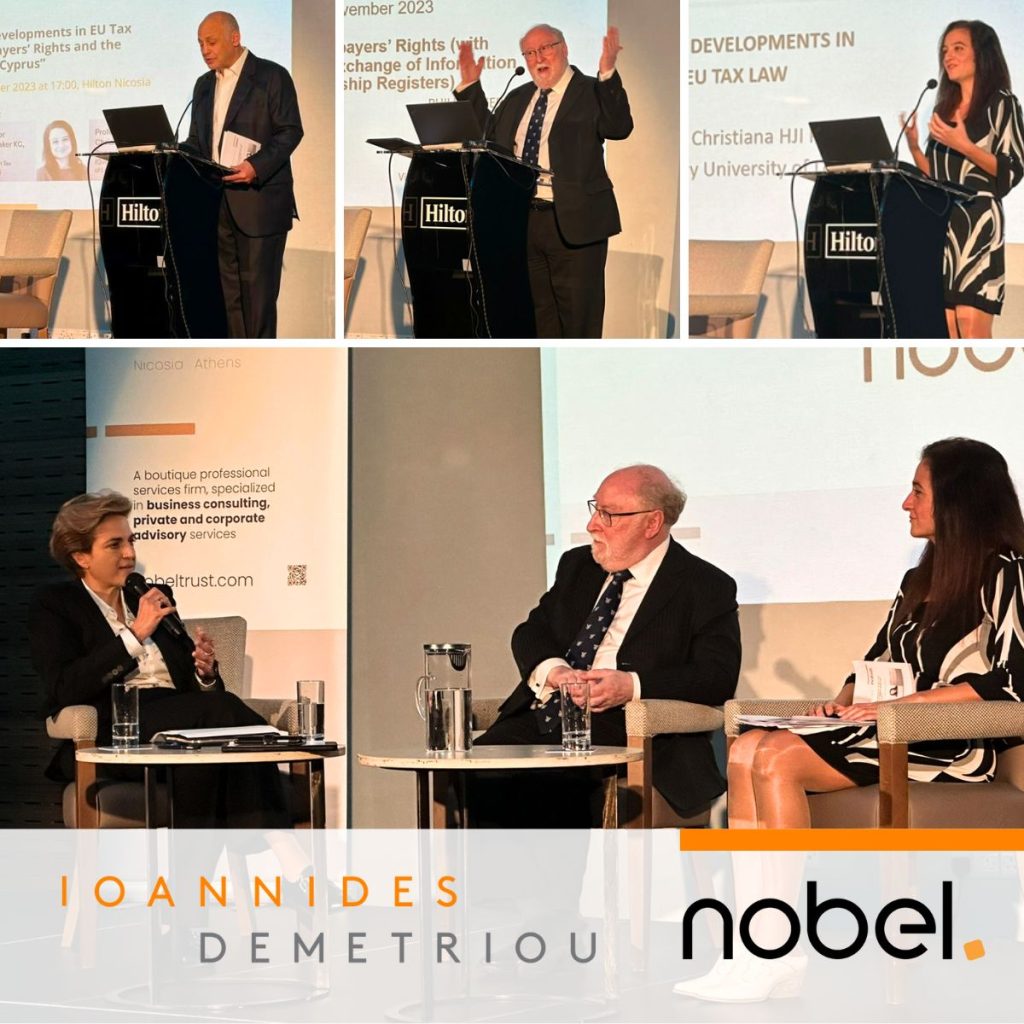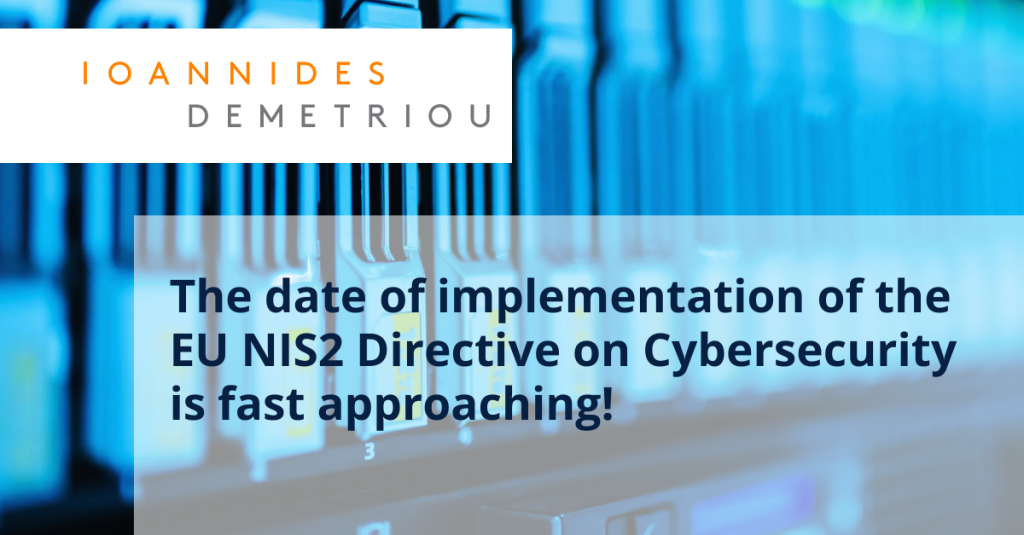NEWSLETTER by Professor Christiana HJI Panayi, Special Counsel for Tax
On 30th November 2023, Ioannides Demetriou LLC & Nobel Trust Ltd organised a seminar entitled “Recent Developments in EU Tax Law, Taxpayers’ Rights and the Impact on Cyprus”. The keynote speaker for this event was Professor Philip Baker, KC, OBE. I was also a speaker in this seminar, covering in detail the issues discussed in my last newsletter.

Professor Philip Baker is a leading expert in international and EU tax law. He is a practicing barrister and King’s Counsel, practicing from chambers in Field Court, Gray’s Inn. Additionally, he is a Visiting Professor at the Law Faculty of Oxford University and a Senior Visiting Fellow at the Institute of Advanced Legal Studies, University of London.
Professor Baker has a particular interest in taxation and the European Convention on Human Rights and is widely considered as an authority on this area of law. Therefore, it was a great privilege to hear Professor Baker’s presentation in this seminar.
Professor Baker first gave a general overview of the legal framework for the protection of taxpayers’ rights and the important function of these rights. He talked about the expanding powers of tax authorities and the need for safeguards and limits. Some examples of taxpayers’ rights include the confidentiality of personal data, rights during investigations and audits as well as trials, rights during enforcement of taxes etc.

He explained that there are different levels of protection of these rights: protection under domestic law (e.g. under the tax law, and/or administrative law, and/or constitutional law), protection under international law (e.g. the International Covenant on Civil and Political Rights and the International Covenant on Economic Social and Cultural Rights) and protection under regional laws such as the European Convention on Human Rights (ECHR) and the EU Charter of Fundamental Rights (CFR). The protection offered by the CFR on taxpayers’ rights, as relevant to the audit process, investigations, information orders and penalties was discussed in more detail in a previous newsletter.
Professor Baker discussed how rights under the ECHR, the CFR and general EU law have an important impact on issues such as data protection, exchange of information and beneficial ownership registers.
As far as data protection is concerned, the relevant rights are Arts 8 of the ECHR, Arts 7-8 of the CFR but also Arts 16 TEU and Art 39 TEU. The GDPR legislation is also very important. All these rights impose restrictions on the use of data and obligations for the protection of data by authorities. There are of course limitations to the protection offered by these rules, as shown in some cases litigated at the Court of Justice, which were briefly discussed in the seminar.
As far as automatic exchange of information is concerned, Professor Baker explained that although this is now widely spread as a result of FATCA and subsequent OECD/G20 but also EU developments, this does not mean that it is immune from attack under the existing legal framework. In the past, warnings were sounded by, inter alia, the European Data Protection Board, as regards the inadequate protection of taxpayers’ data due to the roll-out of automatic exchange of information. With the intensification of automatic exchange of information both internationally and in the EU context, the possible tensions with the legal framework for the protection of taxpayers’ rights should not be underestimated by all relevant parties: tax administrations, banks, (tax) data collectors and taxpayers. Professor Baker also predicted that there is a likely to be a challenge to FATCA and the OECD’s Common Reporting Standard soon. ‘This is a time bomb about to explode’, he warned.
Finally, Professor Baker discussed issues pertaining to public registers of beneficial ownership. Following the direct challenge to the lawfulness of public access to beneficial ownership registers in the SOVIM case, Cyprus, in addition to other Member States have closed their registers. Other Member States have kept them open. Professor Baker questioned whether public beneficial ownership registers are lawful under EU law and whether access only to those who can show a legitimate interest would be sufficient to comply with Arts 7 and 8 CFR.
Professor Baker concluded his presentation by arguing that there needs to be a balance between rights to privacy/data protection and the disclosure of wrong-doing and tax evasion. How this balance can be achieved by the relevant actors (e.g. tax authorities and financial institutions) is a difficult question which can only be addressed by careful examination of the various layers of legal principles pertaining to this area.
Recording of Professor Baker’s and Professor HJI Panayi’s presentations
For more information on any of the issues raised in this seminar, please get in touch with us.



